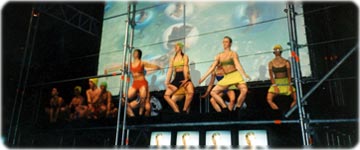Expo 2000, Hanover
Overview
Review
Interviews
In the Press
Links
Literature
|
Expo 2000, Hanover Overview Review Interviews In the Press Links Literature |
|||||
| |
Futuristic Work-Out  Other interesting questions are raised by Expo's thematic area The Future of Work. It illustrates the paradigm shift from lifelong employees' biographies to project-based, internationalized work. The Belgian dance theater choreograph Fréderic Flamand staged a futuristic, imaginative, sarcastic work-out. Tomorrow's famous "knowledge society" appears as a hollow, superficial recreation society, when dancers in swimsuits demonstrate relaxation in front of projections of overcrowded beaches. Performers juggle torches while their movements are embedded into video clips that show child workers in the third world, sweating, groaning. However, the scene also changes to chilly, hectic high-tech work visions. "We stage a live performance with human interaction because we are convinced that all scenarios about the future of work will be centralized around the human being," explains project manager Stefan Iglhaut [listen to the interview]. >> Page 1 | Page 2 | Page 3 | Page 4 | Page 5 | Page 6 | Page 7 TOP |
||||
Project Background | Events | Reports and Essays Zukunftszeugen | Contact Us | Home Page Last Modified: 2002-04-23 TOP |
|||||